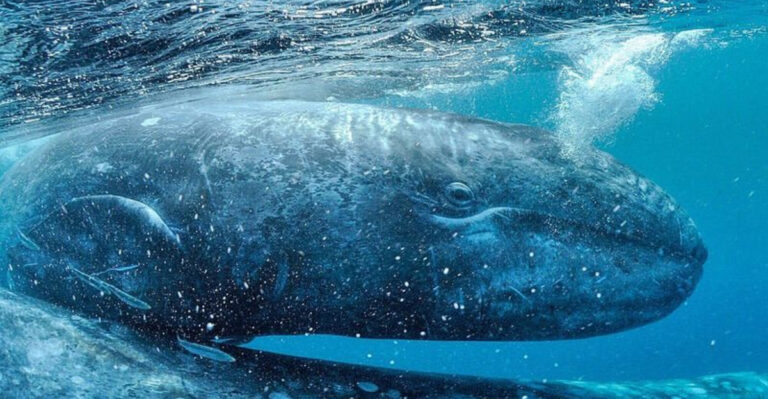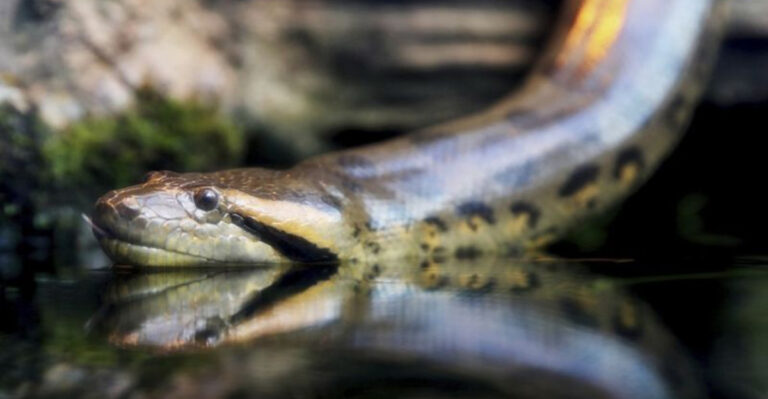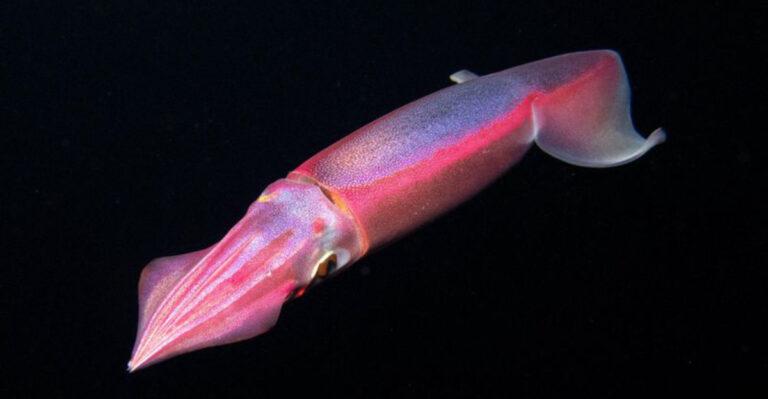15 Incredible Reasons Why Octopuses Are The Smartest And Most Fascinating Creatures Under The Sea
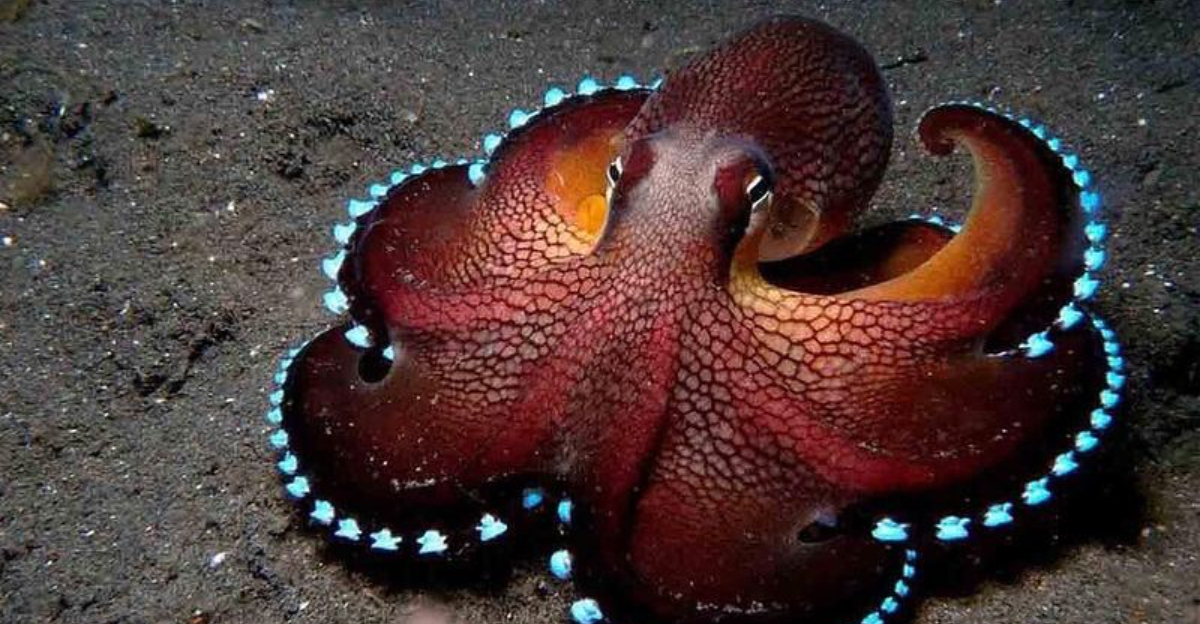
Octopuses, with their enigmatic eyes and eight tentacles, are not just ordinary sea creatures. These fascinating invertebrates captivate us with their remarkable intelligence and mysterious behaviors.
So, are you ready to explore the most incredible reasons why octopuses stand out as the most intelligent and intriguing beings beneath the waves?
1. Master Of Disguise
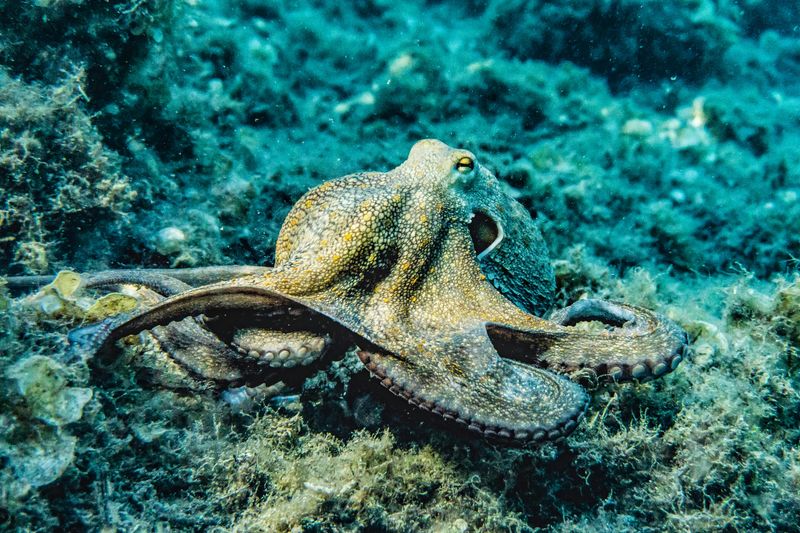
Octopuses are the ultimate masters of disguise. Through specialized skin cells known as chromatophores, they can instantly change color, texture, and even pattern to blend seamlessly into their surroundings.
This ability not only helps them evade predators but also aids in hunting unsuspecting prey. Imagine an octopus nestled among coral, virtually invisible to both prey and predator alike. This camouflage capability is so advanced that it’s been studied to inspire technologies in materials science and military applications.
Beyond just color, octopuses can alter the texture of their skin to mimic rocks, sand, and other natural marine textures. This capacity showcases an incredible level of neural sophistication, as they must quickly process environmental cues and respond accordingly.
Their skin can even reflect the shifting patterns of sunlight filtering through the water, making them appear as just another part of the ocean landscape. Such abilities demonstrate not only survival instincts but also an innate intelligence that invites admiration and scientific curiosity from humans.
2. Complex Problem Solving
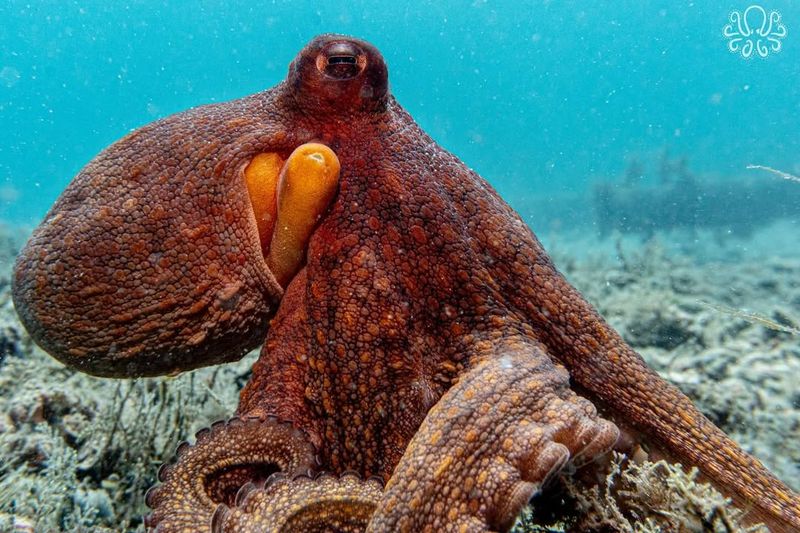
Octopuses are renowned for their complex problem-solving skills, which are rare in the animal kingdom. Picture an octopus facing a closed jar with food inside. It will skillfully twist the lid open, demonstrating not just dexterity but also cognitive understanding of cause and effect. This ability to solve problems extends beyond the simple tasks we observe in captivity, permeating their interactions in the wild.
In natural environments, octopuses face the daily challenge of finding food and avoiding threats. Their problem-solving prowess is evident in the way they navigate mazes, escape enclosures, and even use tools.
There have been documented cases of octopuses using coconut shells to shield themselves, displaying foresight and strategic planning. These behaviors are indicative of a high degree of intelligence, surpassing that of many other marine and land animals.
Such intellectual capabilities provide them with a significant evolutionary advantage, allowing octopuses to thrive in various environments. This combination of mental acuity and adaptability makes them a subject of extensive scientific study and admiration.
3. Unique Reproduction Strategies
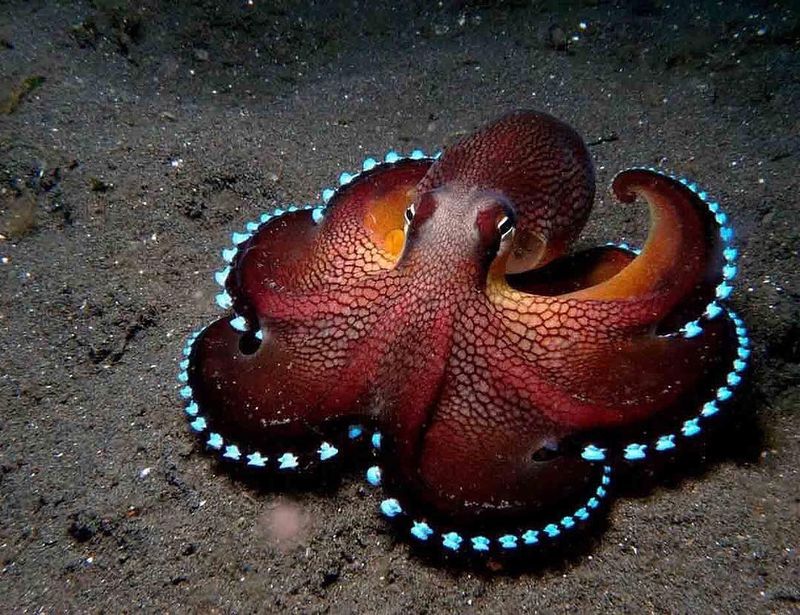
The reproductive strategies of octopuses are as unique as they are fascinating. Female octopuses lay thousands of eggs, carefully tending to them until they hatch.
During this period, the mother octopus forgoes eating to protect her offspring, showcasing an extraordinary level of dedication and sacrifice. Once the eggs hatch, the female often dies, marking a poignant end to her life cycle.
The process begins with a single mating event, where the male octopus uses a specialized arm, known as a hectocotylus, to transfer sperm packets to the female. This intricate method of reproduction is not just a biological process but a reflection of the complexities of their life cycle.
Furthermore, octopuses often choose secluded, well-hidden corners of the ocean floor or coral reefs to lay their eggs, ensuring maximum protection from predators. The strategic selection of nesting sites is a testament to their instinctive intelligence and awareness of environmental threats.
The life of an octopus mother is a remarkable tale of sacrifice and perseverance, echoing the intricate and intelligent design of these cephalopods.
4. Regenerative Abilities
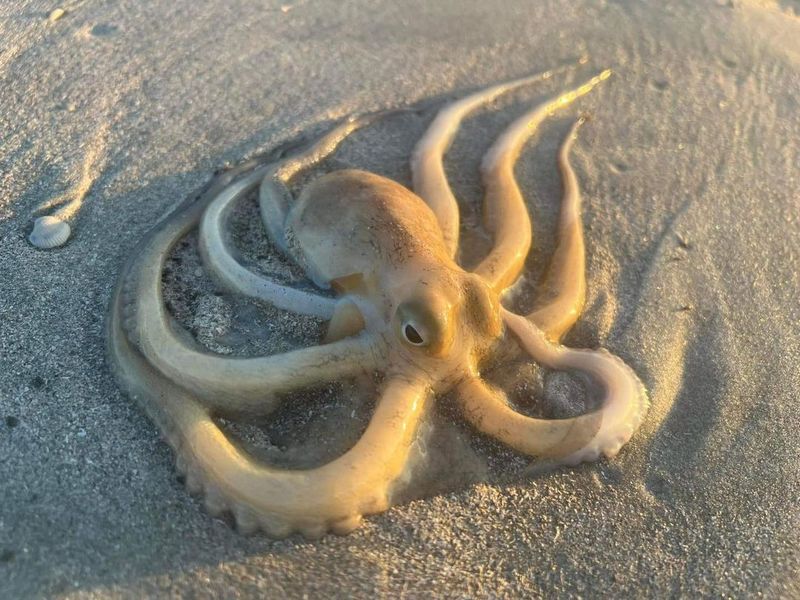
One of the most astonishing features of octopuses is their ability to regenerate lost limbs. This regenerative prowess is not only impressive but a critical survival tool in the wild.
When threatened, an octopus can sacrifice an arm to escape predators, knowing it will grow back over time. This biological marvel is akin to science fiction, yet it’s a reality for these remarkable creatures.
The regeneration process begins almost immediately after the arm is lost. Stem cells in the remaining stump rapidly divide and differentiate to form a new limb, replete with nerves, muscles, and even a functional sucker system.
This regrowth is not just about replacing what was lost but restoring full functionality, allowing the octopus to return to its life unimpeded.
Such an adaptation provides octopuses with a unique advantage in the predator-rich environments they inhabit. It is a testament to the resilience and adaptability of these cephalopods, further illustrating the sophisticated evolutionary pathways they have traversed.
This ability continues to intrigue scientists, offering insights into potential applications for human medicine and regenerative therapies.
5. Emotionally Expressive Eyes
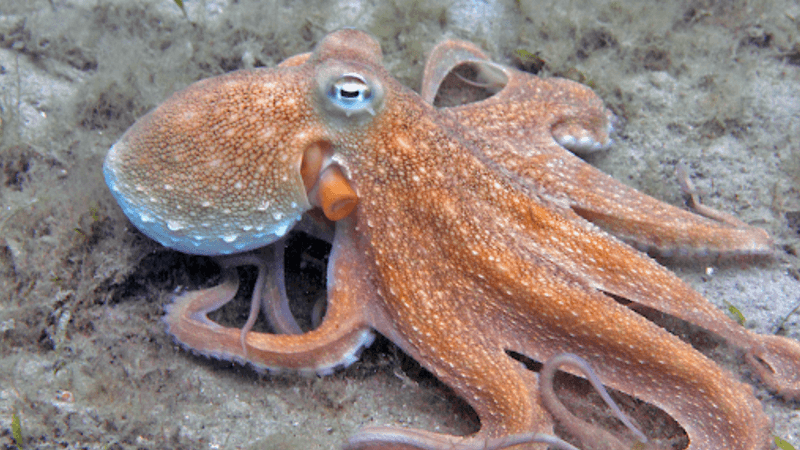
The eyes of an octopus are one of its most captivating features, often described as windows to their souls. Expressive and complex, these eyes are remarkably similar to those of humans, both in structure and function. With the ability to detect polarized light, octopuses can perceive their environment in ways humans can only imagine.
Their eyes are capable of conveying a range of emotions, from curiosity to agitation, providing a unique glimpse into their inner world.
This emotional expressiveness is not just a superficial trait but an indication of their advanced neural processing abilities. It allows them to interact with their environment and with each other in sophisticated ways, often leading to remarkable displays of behavior.
Furthermore, the advanced optics of octopus eyes enable them to hunt with precision, even in low-light conditions. The depth of field and clarity they possess are evolutionary adaptations that have equipped them to be effective predators.
Such intricate and expressive eyes enhance our understanding of octopuses as intelligent and emotionally complex creatures, bridging an empathetic connection between them and human observers.
6. Tool Usage
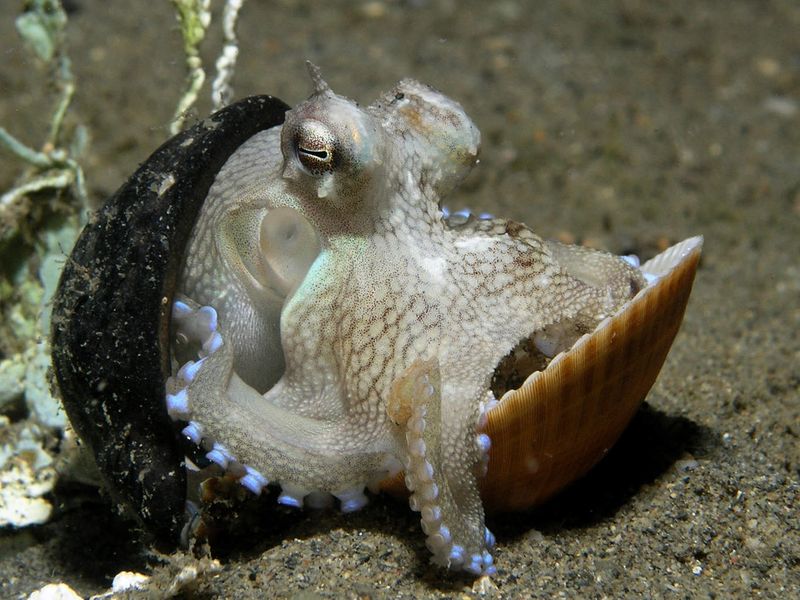
Octopuses are one of the few invertebrates known to use tools, a trait that highlights their intelligence and adaptability. This behavior is most famously observed in the veined octopus, which collects coconut shells and other debris to use as portable shelters.
By stacking and carrying these shells, the octopus can quickly hide from predators, showcasing an understanding of the tools’ protective advantages.
The use of such tools is not instinctual but learned, suggesting a level of cognitive complexity that parallels that of some vertebrates.
Octopuses have been observed selecting specific items for their utility, demonstrating foresight and an ability to plan for future needs. This behavior is not only fascinating but underscores the mental flexibility of these creatures.
Tool use in octopuses is a subject of great interest to scientists, as it provides insight into the evolutionary development of intelligence.
Studying these behaviors helps us understand the convergent evolution of complex cognitive traits across different species, offering a glimpse of how intelligence manifests in diverse life forms. This capability adds another layer to the rich tapestry of octopus abilities, reinforcing their status as one of the ocean’s most intelligent inhabitants.
7. Impressive Navigational Skills
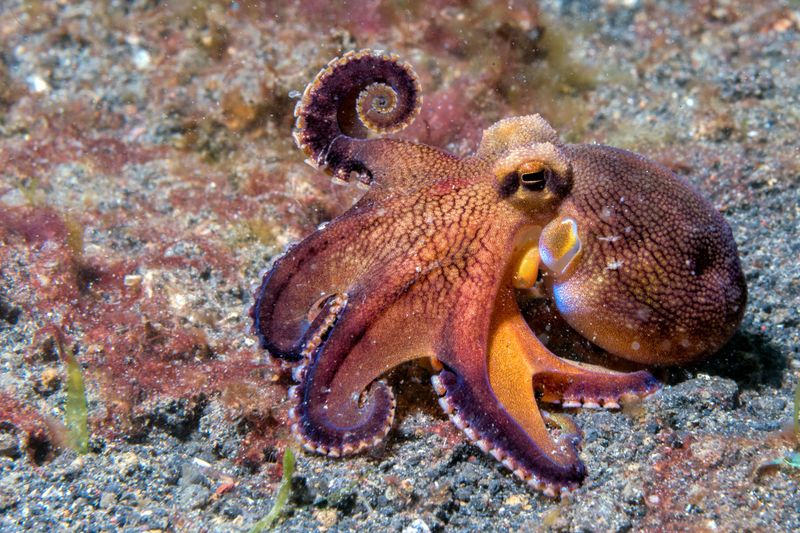
Octopuses possess impressive navigational skills, enabling them to traverse their often intricate and hazardous ocean environments with ease. They can remember intricate routes and landmarks, which is crucial for finding food and avoiding predators. This spatial awareness indicates a sophisticated neural architecture that supports memory and learning.
In laboratory settings, octopuses have demonstrated the ability to navigate mazes, showing not just a keen sense of direction but also the capacity for learning and recall. These experiments reveal how octopuses can adapt to new challenges, adjusting their strategies based on previous experiences. Such adaptability is a hallmark of intelligent beings, highlighting the octopus’s cognitive prowess.
Their ability to navigate is further enhanced by their highly developed sensory systems, which provide them with detailed information about their environment.
By integrating this sensory input, octopuses can map their surroundings and make informed decisions, ensuring their survival in the wild. These navigational skills, combined with their problem-solving abilities, underscore the octopus’s remarkable intelligence and adaptability in diverse marine settings.
8. Sophisticated Communication Methods
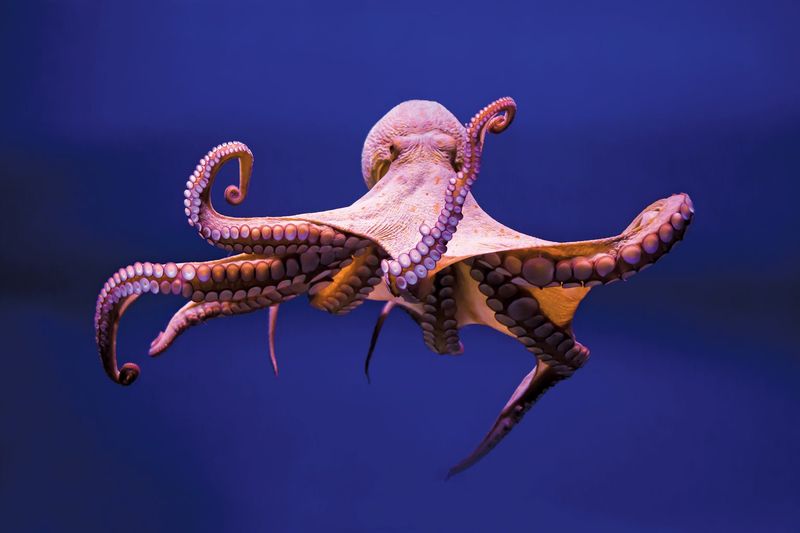
Octopuses have developed sophisticated methods of communication, relying on a combination of color changes, body postures, and skin texture alterations.
Unlike vocal animals, octopuses express themselves through their dynamic appearance, conveying messages to other octopuses and marine creatures in their vicinity. This visual language is complex and nuanced, reflecting their intricate social interactions.
The ability to change color rapidly allows octopuses to express emotions, establish dominance, or signal threats. These changes can occur in the blink of an eye, thanks to the specialized cells in their skin. The rapid shifts in color and pattern serve as a form of visual dialogue, providing a rich tapestry of information that can deter predators or attract mates.
Moreover, octopuses utilize body postures to complement their color signals, adding another layer to their communication repertoire. By extending or curling their arms, or by altering their body shape, they can reinforce their messages and intentions.
This multifaceted system of communication underscores the cognitive complexity of octopuses, offering a fascinating glimpse into the social dynamics of these solitary yet communicative creatures.
9. Mimicry Mastery
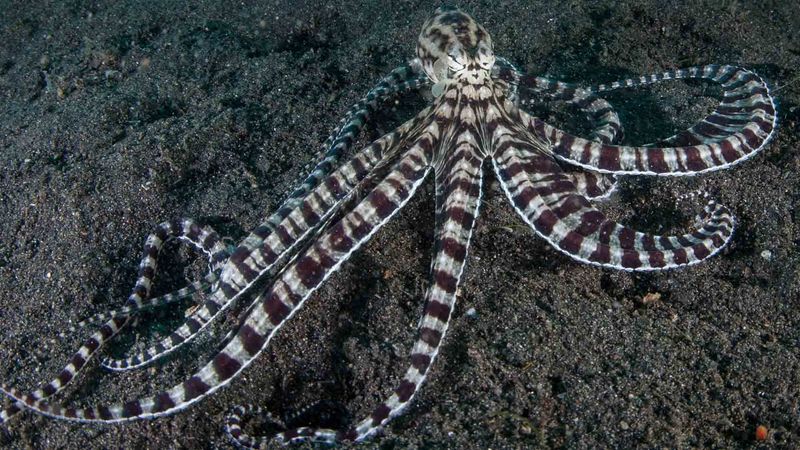
Among their many talents, octopuses excel in mimicry, a skill that allows them to imitate the appearance and behavior of other marine animals.
The mimic octopus, in particular, is renowned for its ability to impersonate a variety of sea creatures, such as lionfish, flatfish, and sea snakes, to deter predators. This ability to transform not just in color and texture, but in shape and movement, is a testament to their intelligence and versatility.
Mimicry in octopuses is an evolved survival strategy that reflects their cognitive capabilities. By mimicking other dangerous or unpalatable species, they can avoid confrontations and navigate their environment with reduced risk.
This form of deception requires not only physical adaptability but also an understanding of the behaviors and threats present in their ecosystem.
The study of octopus mimicry provides valuable insights into the evolution of intelligence and adaptability in marine environments. It highlights how these creatures have developed unique strategies to thrive in the complex world beneath the waves.
Octopuses’ mastery of mimicry continues to captivate scientists and nature enthusiasts alike, showcasing the depth of their ingenuity and survival prowess.
10. Remarkable Learning Abilities
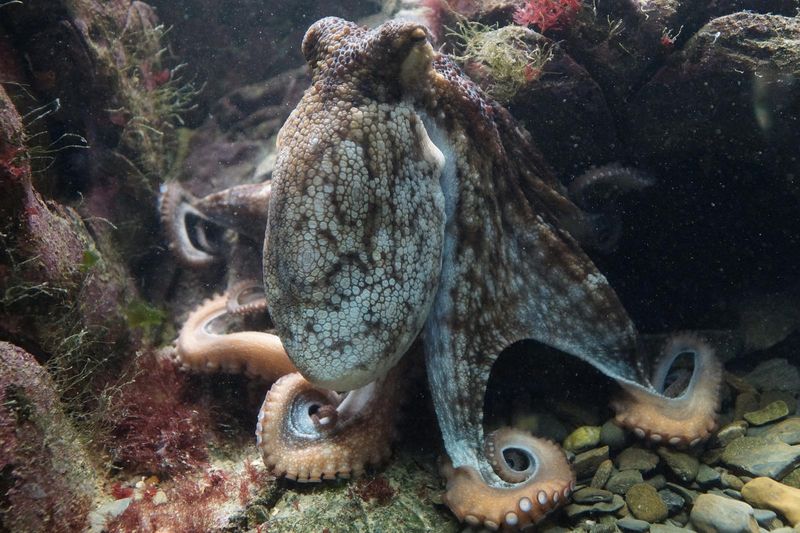
The learning abilities of octopuses are nothing short of remarkable, setting them apart from most other marine animals. They possess the capacity to learn through observation and experience, adapting their behaviors based on past encounters.
In experimental settings, octopuses have been shown to solve puzzles, demonstrating not only memory but also the ability to apply learned knowledge to new situations.
This cognitive flexibility is indicative of a sophisticated nervous system that supports complex learning processes. Octopuses can remember solutions to problems and apply that knowledge to similar challenges, showing a level of intellectual agility that is rare among invertebrates. Their learning is not limited to simple trial-and-error; they can grasp abstract concepts and employ them effectively.
Such learning capabilities suggest that octopuses possess a form of consciousness that is both intriguing and challenging to study.
Their ability to learn and remember reflects an intricate mental landscape that continues to be a major focus of scientific research. These abilities highlight the depths of octopus intelligence, affirming their place as one of the most intriguing beings of the sea.
11. Impressive Physical Dexterity
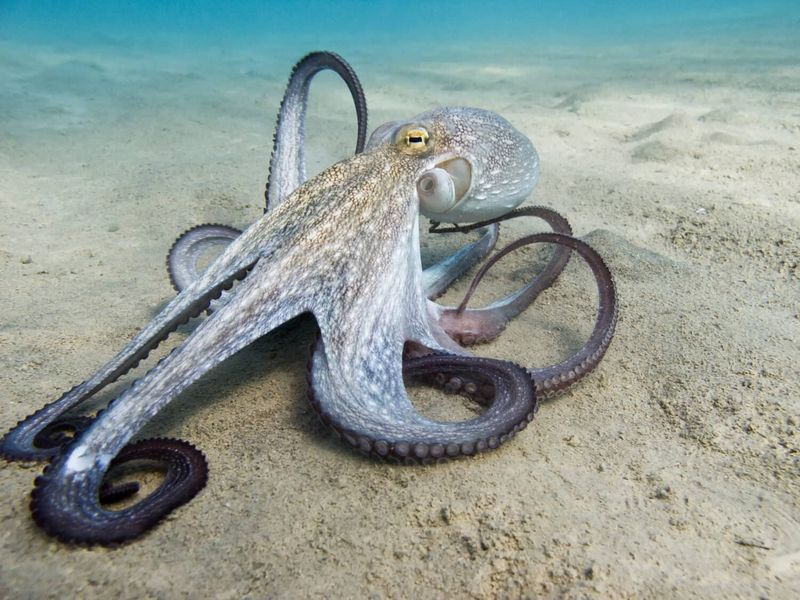
Octopuses possess an extraordinary level of physical dexterity, unparalleled in the underwater world. Their soft, boneless bodies allow them to maneuver through the tightest of spaces, demonstrating a physical agility that is as impressive as it is essential for survival.
This ability to contort and compress their bodies enables them to escape predators and access hidden food sources with remarkable ease.
Each of the octopus’s eight arms operates with a degree of autonomy, thanks to a decentralized nervous system.
This allows them to perform complex tasks simultaneously, such as manipulating objects or exploring their environment, without direct input from the brain. This arm independence is a key aspect of their physical prowess, allowing them to multitask and adapt their movements with precision.
The dexterity of octopuses is a subject of fascination for researchers, particularly in the fields of robotics and biomimetic.
By studying their movement and mechanics, scientists hope to develop new technologies that mimic the octopus’s flexibility and control. This physical adeptness is yet another factor that underscores the intelligence and adaptability of these incredible sea creatures.
12. Strategic Hunting Techniques
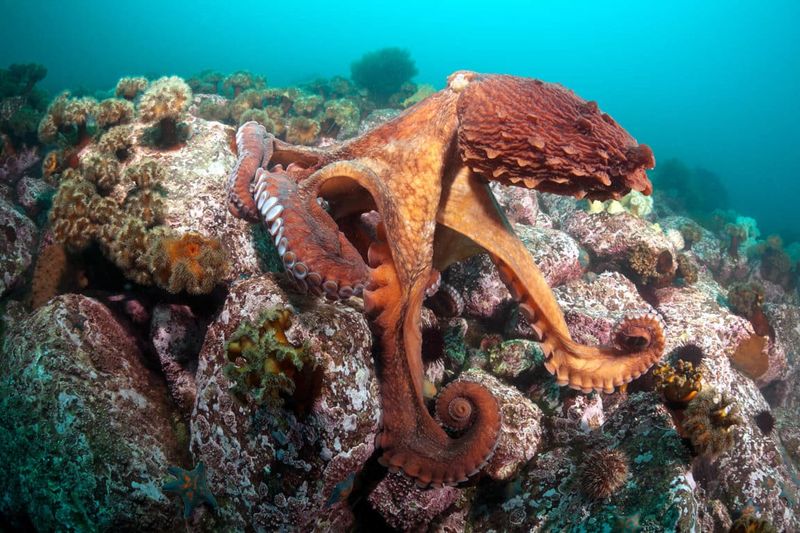
Octopuses are not just opportunistic predators; they employ strategic hunting techniques that reveal their intelligence and cunning.
They are known to use a variety of methods to capture prey, from ambush tactics to stalking and even cooperative hunting with other marine creatures. This versatility in hunting strategies showcases their adaptability and keen understanding of their environment.
One of the most fascinating hunting behaviors observed is their ability to mimic the behavior of prey to lure them in. By altering their appearance and movements, octopuses can deceive their targets, getting close enough to strike with precision.
This level of strategic planning is a testament to their cognitive capabilities, reflecting a deep understanding of the behaviors and weaknesses of their prey.
In addition to individual cunning, some octopuses have been known to coordinate with fish, herding prey into traps where both parties benefit.
This cooperative behavior is rare in the animal kingdom and further highlights the sophisticated social and cognitive traits of octopuses. These strategic hunting techniques not only ensure their survival but also illustrate the depth of their intelligence and adaptability in the wild.
13. Environmental Adaptability
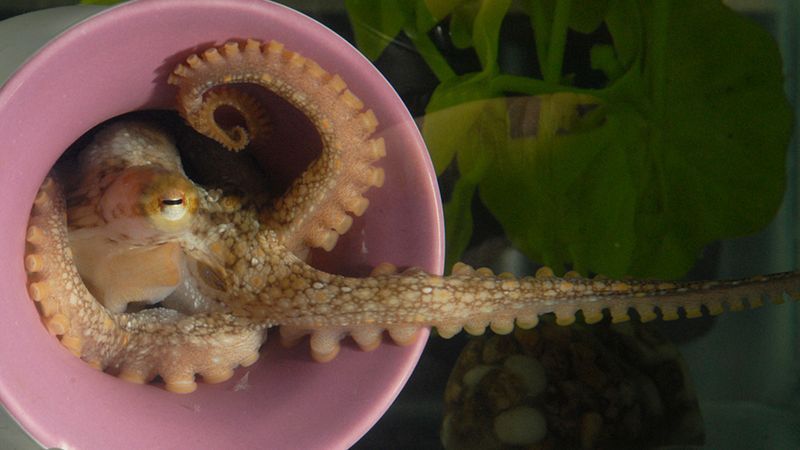
Octopuses exhibit incredible environmental adaptability, thriving in a wide range of marine habitats from coral reefs to the dark depths of the ocean floor.
This adaptability is not just a physical trait but an expression of their intelligence and ability to modify behaviors to suit various conditions. Their ability to survive in such diverse environments showcases their versatility and resilience as a species.
These cephalopods can regulate their body temperature and adjust their metabolic rates to cope with changing environmental conditions.
Their flexibility allows them to inhabit regions with varying temperatures, salinity, and pressure, demonstrating a remarkable capacity to adapt physiologically to their surroundings. This adaptability is crucial for avoiding predators and finding food across different marine landscapes.
The study of octopus adaptability provides valuable insights into evolutionary biology and the mechanisms that enable life to thrive under challenging conditions. Their ability to adjust to new environments showcases not only their survival instincts but also the evolutionary ingenuity that has allowed them to persist and flourish in the world’s oceans.
This environmental adaptability is a testament to their enduring legacy as one of the ocean’s most intelligent and resilient inhabitants.
14. Memory And Recall
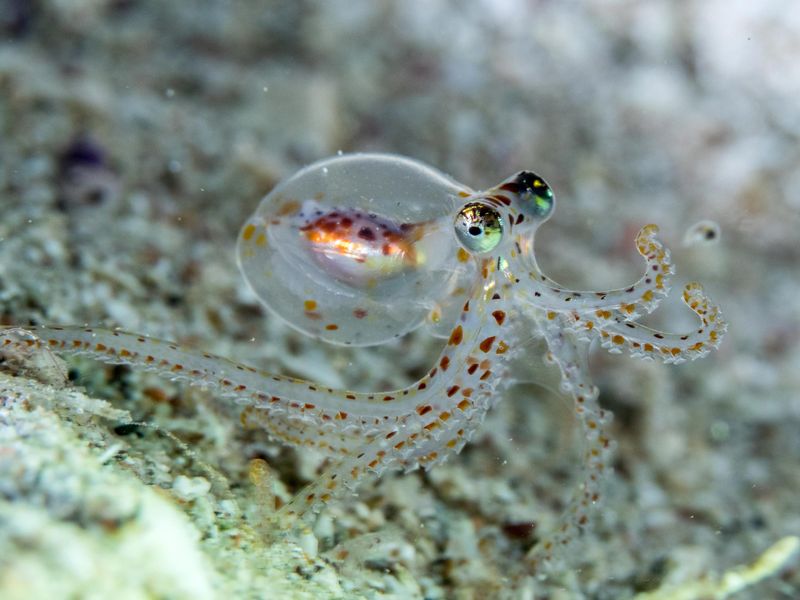
The memory and recall abilities of octopuses are truly extraordinary, enabling them to navigate their world with a level of understanding that rivals many vertebrates.
They are known for their ability to remember locations, routes, and even individual humans with whom they’ve interacted. This memory capacity is not just a survival tool but a reflection of their advanced cognitive functions.
In research settings, octopuses have demonstrated the ability to remember complex tasks and solve problems with remarkable efficiency.
Their capacity for recall allows them to learn from past experiences and apply that knowledge to future challenges. This ability to remember and learn from both positive and negative experiences showcases their intelligence and capacity for adaptation.
The study of octopus memory provides insight into the evolution of intelligence and memory across different species. It challenges our understanding of invertebrate cognition and highlights the unique neural structures that support such capabilities.
This memory and recall ability is a testament to their sophisticated mental framework, reaffirming their status as one of the ocean’s most intelligent and enigmatic creatures.
15. Clever Escape Artists
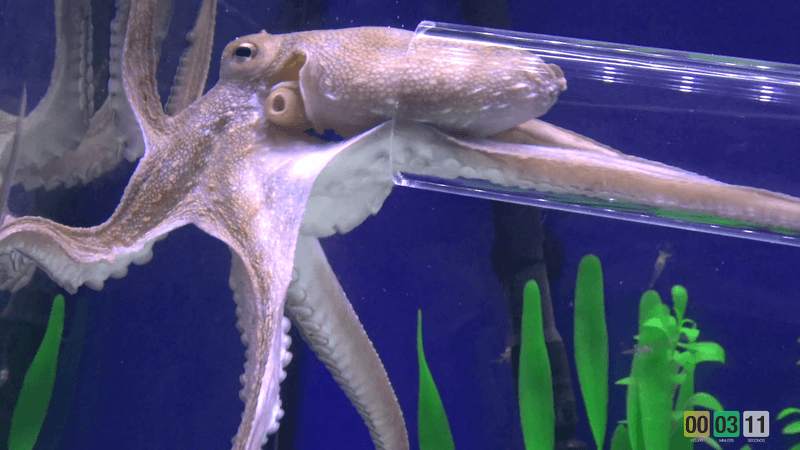
Octopuses are notorious for their escapism skills, often outsmarting their human caretakers in aquariums with their cleverness and ingenuity.
They possess the remarkable ability to squeeze through tiny openings, unscrew jar lids, and even navigate complex mechanical structures to escape confinement. This aptitude for escapism is a testament to their intelligence and resourcefulness.
Their escape artist tendencies are not merely for show; they are essential survival skills in the wild. In their natural habitats, octopuses often find themselves in tight spots, literally, and their ability to escape predators and tight spaces is crucial for their survival.
This skill is complemented by their problem-solving abilities and physical dexterity, allowing them to find creative solutions to obstacles.
The escapism of octopuses has intrigued and challenged scientists and aquarium keepers alike, prompting numerous studies into their behavior and cognitive abilities. These escapades highlight their natural curiosity and determination, reinforcing their image as one of the ocean’s most intelligent and fascinating creatures.
Their cleverness in escaping captivity mirrors their adaptability and ingenuity in the wild, making them a perpetual subject of wonder and admiration.




